Angela Merkel defends ties with Russia and blocking Ukraine from Nato
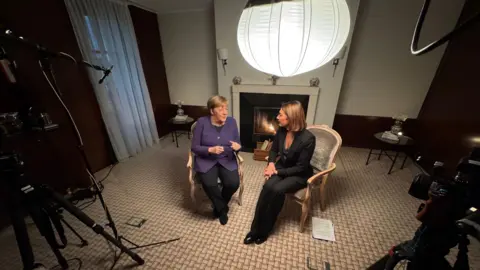 BBC
BBCFormer German Chancellor Angela Merkel has told the BBC the gas deals she made with Russia were intended to help German firms and kept the peace with Moscow.
She also insisted the war with Ukraine would have started earlier if she hadn’t blocked Kyiv’s entry into Nato in 2008.
Angela Merkel led Germany for 16 years. She was in office during the financial crisis, the 2015 migrant crisis and, significantly, Russia’s 2014 invasion of Ukraine.
Was she too soft on Moscow? Too slow to help Kyiv? If she hadn't blocked Ukraine’s Nato membership in 2008, would there be a war there now?
Speaking to the BBC in Berlin, Mrs Merkel is robust in her defence of her time in office.
She says she believes the war in Ukraine would have started sooner and would likely have been worse, if Kyiv had begun the path to Nato membership in 2008.
"We would have seen military conflict even earlier. It was completely clear to me that President Putin would not have stood idly by and watched Ukraine join Nato.
"And back then, Ukraine as a country would certainly not have been as prepared as it was in February 2022."
Ukraine President Volodymyr Zelensky disagrees.
He describes Mrs Merkel’s Nato decision, backed by then-French President Nicolas Sarkozy, as a clear "miscalculation" that emboldened Russia.
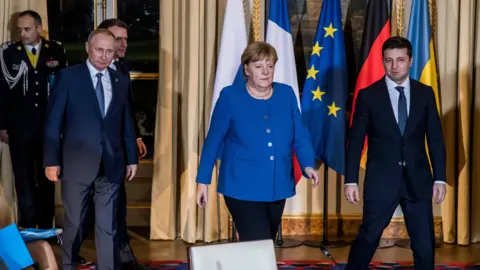 Getty Images
Getty ImagesIn a rare interview since she stepped down from politics three years ago, Mrs Merkel expresses concern about Vladimir Putin’s renewed threats of using nuclear weapons.
The two leaders got to know each other well over the course of two decades.
"We must do everything possible to prevent the use of nuclear weapons,” the former German Chancellor says.
"Thankfully, China also spoke about this a while back. We shouldn't be paralysed by fear, but we must also acknowledge that Russia is the biggest, or alongside the US, one of the two biggest nuclear powers in the world.
"The potential is frightening."
Despite enjoying high popularity ratings during most of her time in office, Mrs Merkel now finds herself on the defensive.
She has just published her memoir, Freedom. And the timing is interesting.
She says she did everything in her power to ensure peaceful means of co-operation with Russia.
In fact, Mr Putin launched his full-scale invasion of Ukraine just months after she left office.
This prompted a thorough re-examination in Europe of energy policies, diplomacy with Russia and also migration policies that had become the norm under Mrs Merkel.
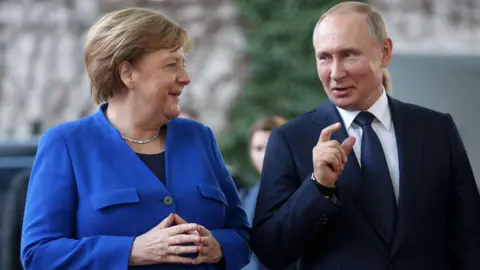 Getty Images
Getty ImagesAt the helm of Europe’s biggest economy, she was, as former Italian premier Matteo Renzi says, the de-facto leader of Europe - "the boss of the European Union".
"Do you remember when [former US Secretary of State] Henry Kissinger used to say 'what is the telephone number of Europe?'," he says. "My answer was: clearly, the mobile number of Angela Merkel."
He adds that when judging the Merkel legacy - over Russia and otherwise - it is important to remember the norms of the time.
"One cannot attack Angela for the relations with Russia," he says.
"In 2005, 2006 [they] were a goal of everyone in Europe, not only a goal of Angela Merkel."
Under Mrs Merkel, Germany and its energy-hungry big industries became dependent on Moscow. Germany built two gas pipelines directly linked to Russia.
President Zelensky described that cheap gas as a geopolitical tool of the Kremlin.
Mrs Merkel tells the BBC she had two motives with the pipelines: German business interests but also maintaining peaceful links with Russia.
Fellow EU and Nato members in eastern Europe strongly disagreed with her.
The Polish MP, Radoslaw Fogiel, said German gas money filled Russia’s war chest - used to fund the invasion of Ukraine.
Mrs Merkel insists she tried to curb Russian attacks on Ukraine using diplomacy and negotiations, which - she admits - ultimately failed.
And German industry has been disproportionately hit by sanctions on Russian energy. Forced to look for other suppliers, the country is now buying expensive LNG. Businesses says they are crippled by the costs.
A new era in Europe’s relations with Russia "regrettably" began following the full-scale invasion of Ukraine, says Mrs Merkel.
On Monday, defence ministers from the UK, France, Germany, Poland and Italy are meeting to discuss the deteriorating situation on Ukraine’s frontlines.
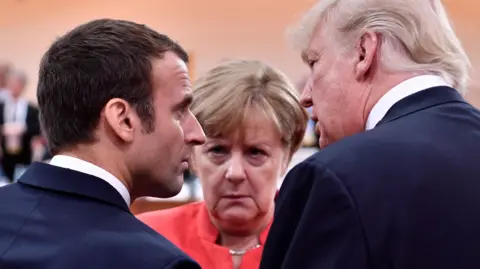 Getty Images
Getty ImagesMs Merkel, 70, now finds herself having to defend her legacy in other areas too.
The migration crisis of 2015, when she famously opened Germany’s doors to over a million asylum seekers, was perhaps the defining moment of her time in office.
It was hated by some, hailed by others.
US President Barack Obama praised her as a courageous and moral leader.
But critics blamed her for breathing life into the then almost redundant far-right Alternative for Germany (AfD) party.
It is now polling comfortably in second place in German public opinion polls, ahead of a snap general election early next year.
The AfD’s main political rallying cry: a strong anti-migrant message.
Angela Merkel admits the AfD made big gains, but she makes no apology for her political decisions.
As for suggestions that her 2015 policies helped fuel anti-immigration and far-right parties elsewhere too, including the Netherlands, Poland and France, after she tried to impose migrant quotas across EU countries, Mrs Merkel says she can’t be held responsible for all of Europe.
The only way to combat the far right is to stop illegal migration, she says.
She calls on Europe’s leaders to invest more in African nations to improve standards of living there, so fewer people will be tempted to leave their homes.
But with Europe’s economies sluggish, and voters worried about the cost of living, governments say there is little cash to spare.
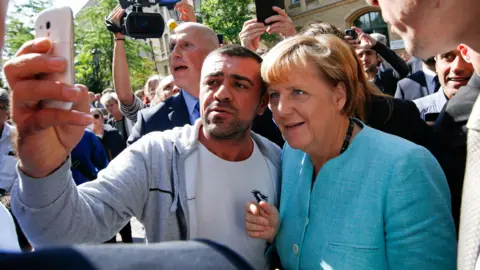 Reuters
ReutersAngela Merkel appeared to put her country and its economic interests first when it came to buying Russian energy or during the eurozone crisis - when southern EU nations blamed her for squeezing them with austerity measures in order to rescue German banks and businesses.
But even at home in Germany, she is now accused of simply "managing" successive crises and failing to make far-reaching, perhaps painful reforms to future-proof her country and the EU.
Germany is now labelled by some as "the sick man of Europe".
Once an export powerhouse on the world stage, its economy hovers just above recession.
Voters complain she failed to invest in roads, railways and digitalisation, in favour of maintaining a balanced budget.
Under Angela Merkel, Germany not only became reliant on Russia for energy, but on China and the US for trade. Those decisions have not stood the test of time.
Donald Trump threatens punishing tariffs on imports when he returns to the White House in January.
Mrs Merkel does have some thoughts for Europe’s nervous leaders faced with Trump 2.0.
His first term in office was marked by anger at Europe, particularly Germany, over low defence spending and trade deficits. Those gripes with Europe haven't changed.
What are the Merkel tips for handling him?
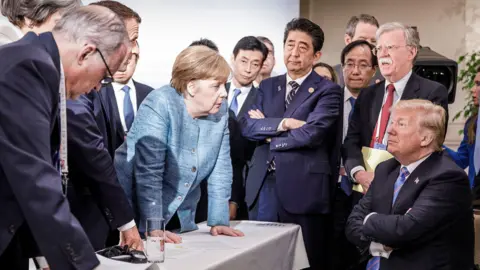 Getty Images
Getty Images"It’s really important to know what your priorities are, to present them clearly and not to be scared, because Donald Trump can be very outspoken," she says.
"He expresses himself very clearly. And if you do that, there is a certain mutual respect. That was my experience anyway."
But Europe’s leaders facing the US, China, and Russia, are apprehensive - arguably more so than during Angela Merkel’s time.
Economies are sluggish, voters unhappy, traditional politics under pressure from the far-right and the far-left.
China and Russia are more bullish, the West weaker on the world stage.
Wars burn in the Middle East and in Europe, with Donald Trump appearing less interested in bolstering European security.
Perhaps that’s why Angela Merkel says, these days, when world leaders she knows well call her for advice, she happily responds.
But when I ask if she misses all that power and politics, her swift answer is: "No, not at all."
In the UK, you can watch Katya Adler's full interview with Angela Merkel on BBC iPlayer.
